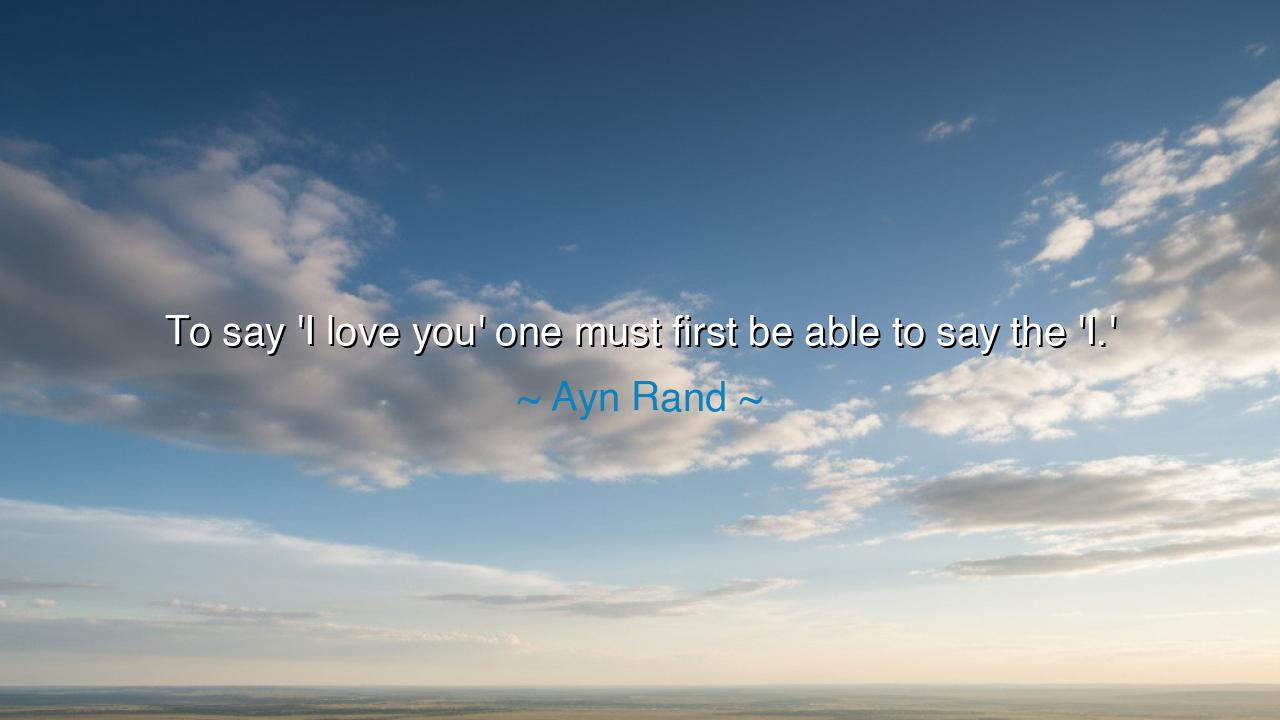
To say 'I love you' one must first be able to say the 'I.'






Ayn Rand, in her deeply provocative wisdom, tells us: “To say 'I love you' one must first be able to say the 'I.'” These words pierce through the layers of romantic ideals and touch the heart of what it truly means to love. To express love for another, we must first have the strength and the clarity to express love for ourselves—to know who we are and what we stand for. The "I", the self, is the foundation upon which all love is built. If we cannot truly understand or accept ourselves, how can we offer love that is pure and whole to another? This is not a selfish love, but a healthy one, where self-awareness, self-respect, and individuality lay the groundwork for genuine connection.
In the ancient world, the wise spoke often of the importance of self-knowledge. Socrates famously proclaimed, “Know thyself.” This wisdom was not just about intellectual understanding, but about the deep awareness of one’s own soul, desires, and limits. Before one could contribute to the well-being of others, the soul must first be aligned with its own true nature. Plato elaborated on this concept, suggesting that love is not just the connection between individuals, but the pursuit of the highest truth and goodness—and that pursuit begins with self-knowledge. Only when we are grounded in our own identity can we extend that love outwardly to others. Without this foundation, love becomes superficial and fleeting, lacking the depth it needs to endure.
Consider the myth of Orpheus, whose love for Eurydice was intense and all-consuming. Yet, he was so deeply consumed by his love for her that he lost sight of himself. His journey to the underworld to retrieve her was driven by love, yes, but also by his inability to truly know himself—his own fears, his own desires, and his own limitations. When Orpheus turned to look back at Eurydice, he failed to recognize his own weaknesses. His love, born of deep feeling but lacking in self-awareness, was ultimately unable to transcend the boundaries of reality. This myth illustrates Rand’s point: without a strong sense of self, the love we offer can become fragile and incomplete.
In contrast, consider the story of Arjuna in the Bhagavad Gita. Arjuna, the warrior, is faced with an overwhelming battle that challenges his identity and his purpose. Before he can fight, he must first come to terms with his own self—his role, his duty, and his values. His journey toward self-realization is not only about understanding his place in the world but understanding his inner nature. In the end, it is through the clarity of self that Arjuna is able to move forward with the battle, not just for victory, but for a higher sense of love—love for duty, justice, and truth. This deeper understanding of self allows him to act with strength and wisdom, offering love in a way that is true and purposeful.
Rand’s assertion that one must first be able to say the "I" speaks to the integrity of love. Love is not a means to escape oneself or lose oneself in the other; it is a way to connect with another soul, deeply and meaningfully, while still remaining grounded in one’s own essence. To love truly is to love with awareness, to give of oneself without losing one’s identity. It requires strength, clarity, and the ability to set boundaries while remaining open and giving. Without this balance, love becomes a sacrifice of the self, which can never be a healthy foundation for a relationship.
In your own life, children of the future, remember that true love begins with self-love. Before you can offer your love to another, you must first cultivate it within yourself. Know yourself—your strengths, your vulnerabilities, your desires, and your boundaries. Only when you understand who you are can you truly love others without losing yourself. Speak the "I" first, and then, when the moment is right, speak the "you". The love you offer will be deep, rooted in the grounding of your own soul, and therefore will be able to sustain and uplift those you love.
So, in all your relationships, whether with friends, family, or romantic partners, remember that the first step in offering love is knowing and accepting the self. The act of loving another is not about losing oneself in them, but about sharing who you are, fully, with them. Love is a gift, but it is a gift that is deepened and enriched by the awareness of one’s own worth. Therefore, speak the "I" proudly, deeply, and with integrity, and in doing so, you will find that your love will be pure, enduring, and true.






AAdministratorAdministrator
Welcome, honored guests. Please leave a comment, we will respond soon